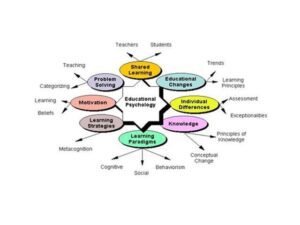Educational psychology is a field that delves into understanding how individuals learn and develop within educational settings. It explores various factors that influence learning, including cognitive processes, social interactions, and environmental factors. By applying psychological principles to educational contexts, educators gain insights into effective teaching strategies, student motivation, and learning outcomes.
1. Behaviorism: Understanding Learning through Observable Behavior
Behaviorism, pioneered by psychologists such as B.F. Skinner and Ivan Pavlov, focuses on observable behaviors as indicators of learning. According to behaviorist theories, learning occurs through conditioning, where individuals acquire new behaviors through reinforcement or punishment. In the classroom, behaviorist principles are applied through techniques such as positive reinforcement, shaping, and behavior modification to encourage desired behaviors and discourage undesirable ones.
2. Constructivism: Fostering Meaningful Learning through Active Engagement
Contrary to behaviorism, constructivism emphasizes the active role of learners in constructing their understanding of the world. Rooted in the works of Jean Piaget and Lev Vygotsky, constructivist theories propose that learners build knowledge through interactions with their environment, prior experiences, and social interactions. In the classroom, educators facilitate learning by providing opportunities for exploration, inquiry, and collaboration, allowing students to construct their knowledge and meaning.

3. Cognitive Theories: Unraveling the Complexities of Mental Processes
Cognitive theories of learning, influenced by psychologists such as Albert Bandura and Jerome Bruner, focus on understanding the internal mental processes involved in learning. These theories highlight the importance of memory, attention, problem-solving, and information processing in shaping learning outcomes. Educators apply cognitive principles in the classroom by scaffolding instruction, promoting metacognitive strategies, and fostering critical thinking skills to enhance learning and retention.
4. Application in the Classroom: Integrating Learning Theories into Teaching Practices
Effective educators integrate principles from various learning theories into their teaching practices to create engaging and meaningful learning experiences for students. By incorporating hands-on activities, real-world applications, and collaborative projects, teachers cater to diverse learning styles and preferences. Additionally, leveraging technology and multimedia resources can enhance instruction by providing interactive and immersive learning opportunities.
5. Conclusion: Embracing Educational Psychology for Enhanced Learning Outcomes
Understanding educational psychology and learning theories helps educators enhance teaching and learning. By integrating behaviorism, constructivism, and cognitive theories, teachers create engaging environments that nurture curiosity and critical thinking. Embracing educational psychology enables educators to innovate for 21st-century challenges.”